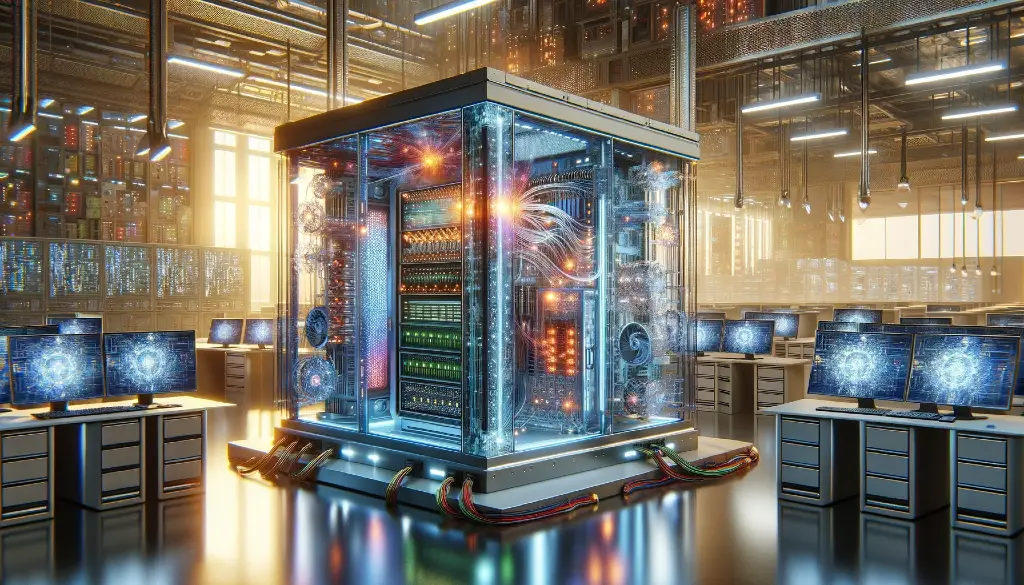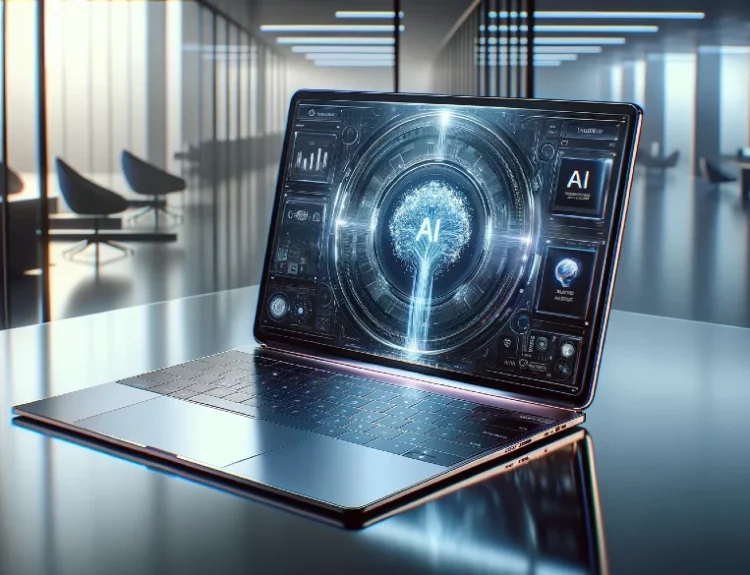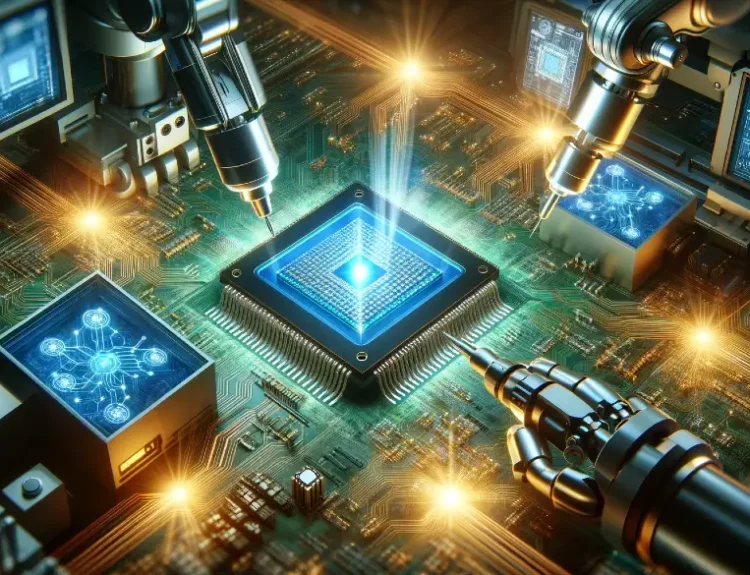Introduction
Artificial intelligence (AI) has become a transformative force across numerous industries, reshaping how we work, live, and interact with the world around us. From revolutionizing healthcare diagnostics to personalizing our online experiences, AI’s impact is undeniable. But its influence extends far beyond the user interface. Today, AI is quietly infiltrating the very foundation of technology – the computer systems that power our digital lives.
This blog delves into the exciting realm of AI computer systems. We’ll explore how AI is driving innovation within the hardware and software that run our computers, pushing the boundaries of performance and efficiency. Buckle up, as we unveil the groundbreaking applications of AI in system optimization, intelligent automation, and the future of computer technology.
The Rise of AI in Computing
The traditional computer system, while powerful, often operates in a reactive manner. Tasks are completed based on predefined instructions. But what if computers could learn, adapt, and optimize themselves? This is the promise of AI computer systems.
These systems integrate artificial intelligence directly into the hardware and software of computers. This can take various forms:
- AI-driven processors: Imagine processors that can dynamically adjust their power consumption or processing speed based on real-time workload demands. AI algorithms are making this a reality, leading to more efficient and energy-saving computer systems.
- AI-powered resource management: Managing system resources like memory and storage can be a complex task. AI algorithms can analyze usage patterns and automatically allocate resources for optimal performance, ensuring smooth operation and preventing bottlenecks.
- Self-learning software: Software traditionally relies on static programming. AI-powered software can learn from user behavior and system data, constantly improving its functionality and adapting to changing needs.
This rise of AI in computing isn’t just theoretical. We’re already witnessing a wave of innovations in AI-powered systems:
- Predictive maintenance: AI can analyze system logs and operating data to predict potential hardware failures before they occur. This allows for proactive maintenance, minimizing downtime and ensuring system stability.
- Automated system tuning: Fine-tuning system configurations for optimal performance can be a tedious task. AI algorithms are streamlining this process, automatically adjusting settings based on workload and resource utilization.
- Security threat detection: Traditional security software relies on predefined signatures to identify threats. AI can analyze network traffic and system behavior in real-time, detecting novel threats and anomalies that might slip past traditional defenses.
These are just a few examples of how AI is transforming the way computers operate. As AI technology continues to evolve, we can expect even more groundbreaking advancements in the years to come.
Benefits of AI-powered Computer Systems
The integration of AI into computer systems isn’t just a buzzword; it unlocks a treasure trove of benefits for users and businesses alike. Let’s delve into some of the key advantages:
- Enhanced Performance and Efficiency: AI excels at analyzing vast amounts of data and identifying patterns. Applied to system management, this translates to significant performance gains. AI algorithms can optimize resource allocation, ensuring critical applications have the resources they need to run smoothly. Additionally, AI can identify and eliminate bottlenecks within the system, freeing up resources and leading to overall system efficiency.
- Intelligent Automation: Repetitive tasks are a fact of life in system administration. AI steps in as a game-changer, automating these mundane yet crucial tasks. From system configuration to software updates, AI can handle them autonomously, freeing up IT professionals to focus on more strategic initiatives. This intelligent automation not only saves time but also minimizes human error, leading to a more reliable and stable computing environment.
- Predictive Maintenance: Imagine a system that can predict its own maintenance needs! AI makes this a reality. By analyzing system logs, sensor data, and historical trends, AI can identify early signs of potential hardware failures. This allows for proactive maintenance, preventing costly downtime and ensuring critical systems remain operational. Predictive maintenance not only saves money but also improves system uptime and overall reliability.
- Data-driven Decision Making: The sheer volume of data generated by modern computer systems can be overwhelming. AI acts as a powerful tool to sift through this data, identify key insights, and provide valuable information for informed decision-making. For example, AI can analyze resource usage patterns and recommend infrastructure upgrades or suggest software optimization strategies based on real-time data. This data-driven approach allows for proactive system management and resource allocation, maximizing the return on investment in computing infrastructure.
The Future of AI in Computer Technology
The future of AI in computer technology is brimming with possibilities. Here’s a glimpse into what lies ahead:
- Advanced AI Technology: We can expect the development of even more sophisticated AI algorithms capable of handling complex tasks currently beyond the reach of traditional computing methods. This could lead to:
- Self-optimizing systems: Imagine computers that can not only learn from data but also continuously optimize their own performance and resource allocation without human intervention.
- Cognitive computing: AI advancements might pave the way for computers that can mimic human cognitive processes, leading to a new era of intelligent computing that can understand and respond to complex user needs.
- AI Integration Across Infrastructure: The influence of AI is likely to extend beyond individual systems and permeate the entire computing infrastructure. Imagine data centers managed by AI, dynamically scaling resources and optimizing network traffic for maximum efficiency. This holistic integration of AI would revolutionize the way we design, manage, and utilize computing power.
Challenges and Considerations
While the future of AI in computing is exciting, it’s important to acknowledge some challenges:
- Explainability: Understanding how AI systems arrive at certain decisions can be complex. As AI algorithms become more sophisticated, ensuring explainability and transparency in their decision-making processes will be crucial.
- Bias: AI systems are trained on data sets, and these data sets can inadvertently contain biases. It’s essential to develop AI systems that are fair and unbiased to avoid perpetuating societal inequalities through technology.
Ethical Considerations:
As AI plays a more prominent role in computer technology, ethical considerations become paramount. We need to ensure that AI systems are developed and deployed responsibly, with a focus on human well-being and societal benefit.
Despite these challenges, the potential of AI in computer technology is undeniable. By addressing these considerations and fostering responsible development, we can harness the power of AI to create a future of intelligent, efficient, and user-centric computing.
Conclusion
The rise of AI in computer systems marks a significant shift in the way we interact with technology. AI is no longer just a user interface phenomenon; it’s becoming the invisible force driving efficiency, automation, and intelligent decision-making within the very core of our computing systems. From optimizing performance to predicting maintenance needs, AI has the potential to revolutionize the way we manage and utilize computing power.
As AI technology continues to evolve, the future holds exciting possibilities. We can expect advancements in self-optimizing systems, cognitive computing, and a holistic integration of AI across the computing infrastructure. However, it’s crucial to address challenges like explainability, bias, and ethical considerations to ensure responsible development and deployment of AI in computer systems.
Ready to join the AI revolution?
At Verdict, we believe in the transformative power of AI. We’re building a platform where machine learning and artificial general intelligence (AGI) evolve through real-world interactions and the collective wisdom of our community. Every search, chat, and shared result on Verdict contributes to building a powerful and human-centric AI.
Join us on this journey! Explore Verdict and be part of shaping the future of AI.
Looking for more AI-powered insights?
Head over to our blog page for even more interesting reads on topics like AI-powered Learning and AI-powered computer robots. We delve into the latest advancements and explore how AI is transforming various industries. Stay tuned for more!










